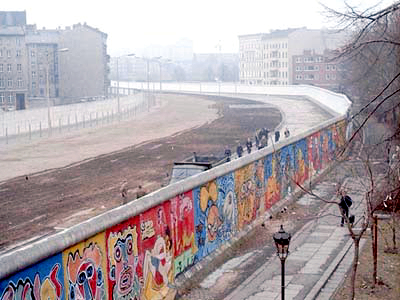The Fall of the Wall (.i. Balla Bheirlín) … as Gaeilge Posted by róislín on Nov 9, 2014 in Irish Language

Balla Bheirlín sa bhliain 1986, cúpla bliain sular leagadh é. (“Berlinermauer” by Noir – http://de.wikipedia.org/wiki/Datei:Bethanien06.jpg; eolas eile thíos)
(le Róislín)
Cúig bliana is fiche ó shin thit Balla Bheirlín. Bhuel, ní go díreach “thit.” “Leagadh” an focal ab fhearr, is dócha. At any rate, the “Wall” is not only a timely topic but it can also give us some good vocabulary practice in Irish.
Before we check out “wall” in general, let’s look at “the Berlin Wall.” For this phrase, “Beirlín” changes to “Bheirlín” [VERzh-leen] and the “b” sound becomes a “v” sound.
Next, we’ll look at several different words for “wall” in Irish. Remember, there are almost always two different ways of saying something, if not more.
There are at least two main words for “wall” in Irish. But the good news is that one of the two words for “wall” (balla) is used much more often than the other. And it sort of resembles the English. Here are the forms:
1) balla, which is masculine, so “the wall” is “an balla”
airde an bhalla [… WAH-luh], the height of the wall, with lenition
na ballaí, the walls
airde na mballaí, the height of the walls, with eclipsis
“Balla” is sometimes also spelled “falla.”
The word “balla” is generally used when we’re talking about interior walls (of a room), or some outdoor walls, especially big or monumental ones: Balla Bheirlín, Balla Mór na Síne, Balla an Olagóin.
It’s also used for many other types of walls: cillbhalla [KIL-WAHL-uh], a cell wall; cuasbhalla, a cavity wall; imbhalla [IM-WAHL-uh], a curtain wall; oighearbhalla [AI-yur-WAHL-uh], an ice wall, and one of my favorites, “balla fialainne” (a wall of a deerpark). Another intriguing usage is “balla fuar” (unmortared wall; “fuar” usually means “cold”).
And here are two examples that are a little more miscellaneous:
oighearshruth ballathaobhach [ AI-yur-HRUH BAHL-uh-HEEV-ukh], a wall-sided glacier. What a nice mouthful to say!
laghairt bhallaí Lilford, Lilford’s wall lizard
2) And then there’s “múr,” which is somewhat more limited in application although it has a wide range of meanings, including “wall,” “bank,” “mound,” and “rampart.” It’s a cognate of Latin “murus,” which gives us English words like “mural,” “intermural,” “intramural,” and “immure.” Here are some of its basic forms:
múr, and it’s masculine, so: an múr, the wall
airde an mhúir, the height of the wall/rampart, etc.
na múrtha, the walls/ramparts, etc.
airde na múrtha, the height of the walls/ramparts, etc.
Examples in phrases include múrealaín (wall art) and múr cosanta (a rampart).
And then, going beyond “balla” and “múr,” there are a few very specific terms for types of walls, like the following:
3) sceimheal, an encircling wall (or “eaves” or “a projecting rim”)
4) spiara, a partition wall (or “diaphragm” in optics; “diaphragm” can also be “eadrán,” or “scannán,” or “scairt” — mh’anam!). “Spiara” also gives us the imminently useful “spiara cráinstalla” (a sow-stall partition).
5) There’s also “claí,” which more typically means a “dike” or a “fence,” but which can sometimes mean “wall”: claí, an claí, airde an chlaí, and plural: claíocha, na claíocha, airde na gclaíocha
For complete contrast, there’s “wall-eyed,” for which there are several words in Irish, but none of them (fad m’eolais) use “balla” or “múr.” They include the following: “glórshúileach” [GLOR-HOO-il-yukh], bánshúileach, and sciathshúileach!
Maybe next time, keeping Ronald Reagan’s quote in mind, we’ll take a closer look at words for “tear,” “knock,” and “pull down.” Which one should one come closest to Reagan’s phrase “Tear down this wall!”, i do bharúil?
And to end on a lighter note, “Goidé a dúirt balla amháin leis an mballa eile?” “Buailfidh mé leat ag an gcoirneál.” And yes, I did hear that joke in the Gaeltacht, specifically in Donegal, as you might be able to tell from the use of “Goidé” instead of “Cad?” or “Céard?” SGF — Róislín
Gluaisín: barúil: opinion; eolas: knowledge; oighear: ice; thit [say “hitch”]: fell
Eolas faoin bpictiúr: “Berlinermauer” by Noir – http://de.wikipedia.org/wiki/Datei:Bethanien06.jpg Original source: “selbst fotografiert”. Licensed under Creative Commons Attribution-Share Alike 3.0 via Wikimedia Commons – http://commons.wikimedia.org/wiki/File:Berlinermauer.jpg#mediaviewer/File:Berlinermauer.jpg

Build vocabulary, practice pronunciation, and more with Transparent Language Online. Available anytime, anywhere, on any device.




Comments:
Kevin:
Múr ! I didn’t know about this one but of course ‘mur’ is the word in French for wall. I think falla is used in Kerry.
I’d be curious to know how to say ‘walled’ as in the context of the city of Derry.
róislín:
@Kevin A Chaoimhín, a chara,
GRMA as scríobh isteach. As you note, a lot of times there are many ways to express one concept, and the words for “wall” provide an example. Sometimes the additional words, which may be less commonly used, show Romance-language roots, rather than Celtic roots, and may reflect different phases of history (Latin influence, Norman influence, etc.). A “walled city” is “cathair mhúrtha” and a “walled town” is “baile múrtha.” Hope this answers your question, and sorry for the delay